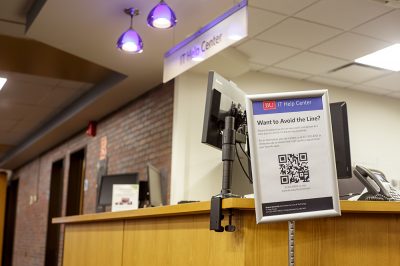Boston University’s Information Services & Technology is struggling to meet the recent “peak” in loaner laptop requests, creating concerns among students during the midterm season.

BU IS&T launched a short-term loaner laptop program during the Fall 2022 semester. The service is designed to assist students at no cost who are unable to use their own computer for academic work. However, students have recently reported that they have been unable to use this service due to high wait times and a lack of availability.
“IS&T is aware of the current peak demand and looking into ways to accommodate it,” BU spokesperson Colin Riley wrote in an email.
Riley wrote that the program’s launch was popular among students, causing there to be an up to five-day waiting period during the busy midterm weeks.
The program contains a total of 50 newly available laptops, which students have the option to borrow for a duration of two weeks, with the possibility of an additional one-week extension upon formal request.
Over the past 14 months, IS&T has successfully completed over 600 requests for laptop loans, Riley wrote.
Students, like Lauren Hughes, a sophomore in Sargent College of Health and Rehabilitation Sciences, are concerned that these wait times will cause disadvantages among technology-based classrooms.
Hughes said these continuous delays are causing a “big disparity.”
“Since Boston University is so academically competitive, I think it really puts people at a disadvantage,” Hughes said. “It is almost a necessity in college, everything is online now.”
Hughes accidentally spilled coffee on her laptop in October, resulting in liquid infiltration that made the screen stop working. Hughes requested a laptop loan at IS&T but was told the laptop would be available in six days because of the lack of availability. Hughes had assignments requiring completion prior to the given timeframe and faced academic challenges.
“I’ve had to go to Mugar and use a desktop,” said Hughes. “It has been super inconvenient because I have to carve out time in my day to go to the library when I could just be doing it from home.”
BU’s Mugar Memorial Library has the University’s largest computer lab, open to all BU students. The library offers a total of 45 desktops, providing a broad range of applications.
However, since desktops are stationary, students who depend on this approach have experienced work-related delays as they must make their way to the library and endure wait times for desktop availability.
Teresa Garate, a sophomore in the College of Arts and Sciences, tried to use Mugar’s desktops after IS&T also gave her a wait time of approximately one week, but said it’s a struggle since “they are not always open” and ready to use.
Garate said her classes go through various readings and assignments per week, all of which are posted and turned into Blackboard, BU’s primary online learning system.
Garate said because of the delay she did her assignments using pen and paper, which was a setback considering her classes were designed around the use of technology.
“I really struggled because I haven’t done it in such a long time,” Garate said. “I would write much slower and miss some things that were being said.”
Hughes and Garate both said this issue was not only a personal inconvenience but also affected those around them.
“I had to ask my roommate if I could borrow her computer,” Garate said. “But it’s also very tricky to do that because she has work to do.”
Sandra Buerger, a senior lecturer for natural science and mathematics, said not having a laptop would challenge her students to keep up with the class since most of her lab coursework is online, including quizzes.
“It is very useful for students to have their own laptop to be able to look at all that information and online quizzes as well,” she said. “It would certainly make it more challenging for the students to get access to the information if they didn’t have their own laptops.”
Buerger said she could “come up with an alternative method” to accommodate for a student’s lack of device. However, she said having a laptop would be much more efficient.
Students have received mixed responses from teachers regarding accommodations.
Hughes said one her professors was discouraging and not understanding that she could not account for the accident and subsequent rental delay.
“Certain professors are very understanding about it,” Hughes said. “They have let me [have] one-day extensions, but obviously it’s still an inconvenience to both.”
Garate said IS&T should be on top of the issue and said the University should be looking to expand the number of laptops available or look for alternative ways to speed up the rental process.
“With the large population of Boston University, it will be more beneficial for everyone to have a certain laptop,” Hughes said. “In the case of emergencies, no student would have to deal with the academic consequences.”
Maya Mitchell contributed to the reporting of this story.















































































































